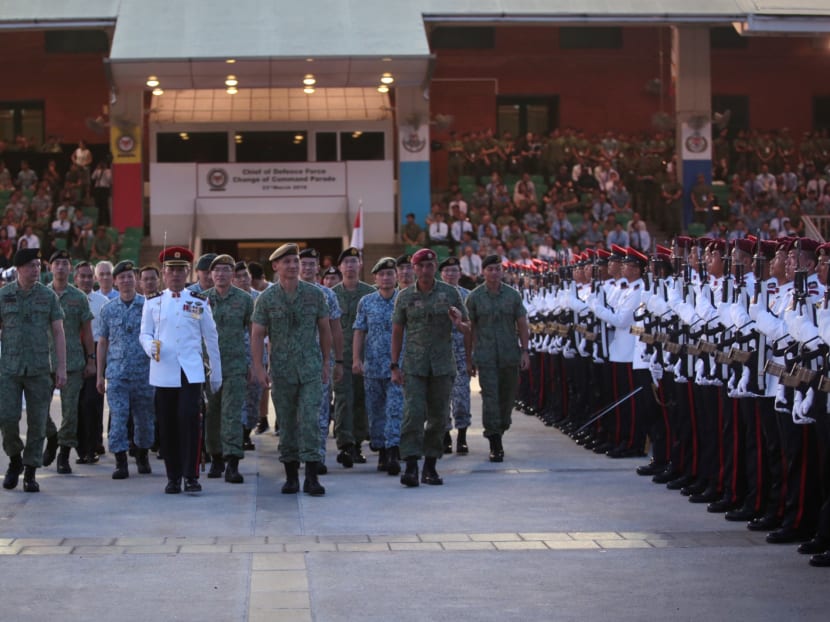15 former senior SAF officers now top public servants, ‘best available’ persons for job: Chan Chun Sing
SINGAPORE — There are 15 former high-ranking Singapore Armed Forces (SAF) officers who are now holding senior leadership appointments in the public service as of Sept 24 this year, Mr Chan Chun Sing said.

A file photo of the Singapore Armed Forces' Chief of Defence Force Change of Command Parade in 2018.
- There are 15 former SAF officers now holding senior leadership positions in the public service
- Cabinet minister Chan Chun Sing said the public service adopts the principle of finding the "best available person for the job"
- Candidates from the uniformed services have skill sets that are generally relevant to senior management positions in the public service, he added
SINGAPORE — There are 15 former high-ranking Singapore Armed Forces (SAF) officers who are now holding senior leadership appointments in the public service as of Sept 24 this year, Mr Chan Chun Sing said.
The Education Minister and Minister-in-charge of the Public Service told Parliament on Monday (Oct 4) that the public service adopts the principle of finding the "best available person for the job" in recruiting for people for senior appointments.
Mr Chan was responding to three parliamentary questions filed by Member of Parliament (MP) Gerald Giam from the Workers’ Party (WP).
Mr Giam’s first question pertained to how many retired SAF officers with the rank of Colonel or Military Expert 7 (ME7) and above have held senior positions in public sector organisations.
The second question was on how the Public Service Division (PSD) determines which officers have sufficient competencies to lead these organisations despite not having had civilian work experience.
The third question posed was if PSD required these officers to spend several years building up sectoral knowledge and skills before leading these organisations.
In response, Mr Chan said that the 15 former officers hold various senior leadership positions as permanent secretaries, deputy secretaries and chief executives, for example, and that they form 10 per cent of these appointments.
“Looking at the figures another way, of the SAF personnel holding the rank of Colonel or ME7 and above who retired between 2010 and now, about 7 per cent went on to assume senior public service appointments.”
Mr Chan added that government agencies typically consider candidates from within the ranks of their organisations, as well as the wider public service — which includes the uniformed services — and the private sector.
When it comes to former uniformed services officers, Mr Chan said that public sector agencies would take a “considered view” of the officer’s career experience and competencies or qualities, together with other available candidates, before deciding on the best person for the senior role.
Candidates from SAF, or the uniformed services in general, including the Home Team, have skill sets that are generally relevant to senior management positions in the public service, he added.
For instance, they would have served in roles that have helped them develop a range of competencies such as strategic leadership, organisation transformation, policy formulation, running of large-scale operations, and technology management.
Furthermore, these officers also have “valuable experience in working with, understanding, motivating and winning the confidence… of Singaporeans from all walks of life”, he said.
For officers who demonstrate the capacity to assume top leadership positions, they are tested and prepared through “challenging postings and leadership programmes”, he added.
These officers are provided opportunities to develop whole-of-government perspectives through inter-agency projects, board directorships and external postings to the public service during their military careers.
“These experiences prepare the officers to assume senior appointments in the military, and also provide them with the background and perspective to take on senior leadership positions in the wider public service, if called upon and found suitable,” Mr Chan said.
However, he clarified that although sector-specific knowledge and skills are part of the considerations, they are not the only considerations.
“Public service leadership teams are expected to comprise leaders who bring diverse experiences to the table and operate cohesively as a team, tapping each other’s skills and experiences.”
FORMER GENERAL APPOINTED AS CEO
In a related question, WP MP He Ting Ru asked how many candidates were considered for the role of chief executive officer of the Early Childhood Development Agency (ECDA) before the Ministry of Social and Family Development (MSF) appointed former SAF Brigadier-General Tan Chee Wee.
She also wanted to know what were the factors and qualifications considered for the candidates, and why MSF appointed a CEO with no early childhood or educational experience.
Mr Tan had established the Inspector-General's Office in 2019 to strengthen safety governance and management systems in SAF in his role as SAF’s first inspector-general.
The 47-year-old will assume his new role as ECDA’s chief on Dec 15, and will be replacing current CEO Jamie Ang. Ms Ang, 44, has been heading ECDA since Oct 1 in 2019.
In response to Ms He’s questions, Mr Masagos Zulkifli, Minister for Social and Family Development, said that “several qualified candidates” were considered by the ministry and PSD.
Mr Tan was “assessed to be the most suitable” among the candidates, though Mr Masagos did not elaborate further.
He disagreed on the point that the former general lacks relevant experience.
“Mr Tan is not unfamiliar with the social sector as he had previously served in the then-Ministry of Community Development, Youth and Sports from 2006 to 2008, where he supervised the macro-planning of government-funded social services and development of the social service sector, building up capabilities and human resources.”











